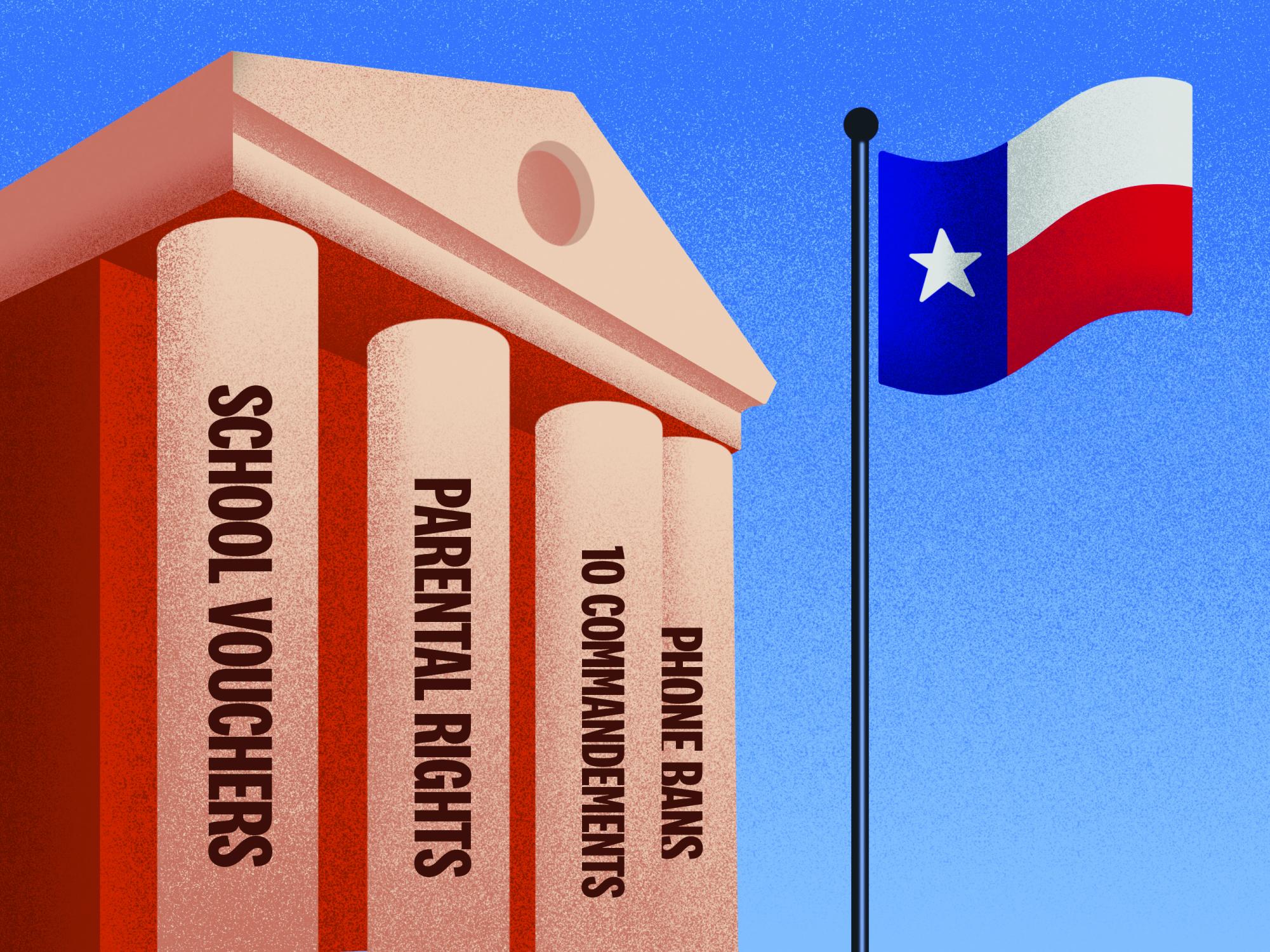In 1995, when math instructor Shane May started teaching, the biggest change in schools was the introduction of the handheld calculator, a device with the computational power to decode previously unsolvable problems.
Teachers and students alike had to adapt to calculator and non-calculator portions on tests and lessons on calculator function and usage.
But three decades later, public schools are undergoing reform again. This time it’s not technology.
School vouchers.
Parental rights.
Ten Commandments.
Phone bans.
Unprecedented acts of legislative power — acts partially driven by political shifts at both the federal and state levels are heppning right here in the state of Texas.
School Vouchers
One of the most notable changes coming to the public school system in Texas is the introduction of school vouchers. Texas recently established the nation’s largest school voucher program through the passage of Senate Bill 2. The program is set to go into effect in the coming 2026-27 school year. The state will allocate $1 billion to the program, and families will be eligible to collect at least $10,000 per student to pay for private school tuition or other educational expenses. While proponents of school choice praise this program for allowing parents to expand their schooling options, some critics argue that its implementation is flawed.
Upper School Mathematics Department Chair Shane May taught in the public school system for 24 years at Deer Park High School in Houston. He isn’t fundamentally opposed to the idea of school vouchers but believes that the program to be implemented next school year could undercut an already weak public school system. The program would incentivize students to leave the public school system and choose other options, and therefore public schools which are funded based on pupil count would lose even more funding.
“The problem is, in the state of Texas, there is a huge budget shortfall,” May said. “And the state is one of the worst states at bringing in the money they need for public education, so I don’t know how vouchers are going to help that situation. To me, it’s going the wrong direction.”
Watt Lesley Black Jr., Clinical Professor in Education Policy and Law at SMU and former public school principal, notes that vouchers may fail to expand opportunities for underprivileged students who want to attend private or public schools out of their district.
“Most kids are not going to be able to make that move (to a private school) on a $10,000 voucher,“ Black said. “And even if they could, how would they get from whatever part of town they live in up to northwest Dallas if they don’t have a car or a school bus? And so I don’t know that (school vouchers) are going to make a huge difference in terms of equity for kids.”
The concept of school vouchers has been a topic of discussion for many years and multiple states have implemented voucher programs. Historically, school vouchers have faced legal challenges regarding the First Amendment, as it was argued that it could be unconstitutional for parents to spend public money to send their children to religious private schools. A 2002 Supreme Court Case shot down this argument and opened the door for more voucher programs.
However, for the Texas school voucher program specifically, there may still be some legal challenges moving forward. Undocumented immigrants are not eligible for the program, which Black says may be a violation of the Equal Protection Clause of the 14th Amendment.
“Any time you limit a protected class from eligibility for a program that’s generally available to everyone else, you’re subjecting yourself to some challenges,” Black said.
Parental Rights
Parental rights over the education of their children, like school vouchers, have been a hot-button topic for many years. Multiple bills increasing parental control have passed through the legislature and taken effect as of Sept. 1. Senate Bill 12, dubbed the “Parents’ Bill of Rights,” is one of these bills. The issue is backed mainly by precedent in courts.
“There were three court cases in the 1920s that established, constitutionally speaking, the idea that parents have a 14th Amendment right to control the educational upbringing of their children,” Black said.
However, parents are now seeking more rights regarding their children’s education, whether it be through school board meetings or restrictions on access to certain library books.
“Senate Bill 12 has some things in place to help parents who have grievances against the school district,” Black said.
Two other bills, Senate Bill 204 and Senate Bill 13, also concern parental rights in the classroom. The passage of both would grant substantial power to parents over their children’s schools — this naturally worried individuals who may have believed that the students themselves should have some control over their own education.
“Senate Bill 204 requires school board members to get training on parental rights and it requires them to publish a parental rights handbook,” Black said. “Senate Bill 13 gives parents some additional rights around library books. It entitles parents to access information regarding what books their children (are reading). But I think most schools are already doing that.”
These bills follow strict nationwide book bans that have plagued the education system for years.
“I think (the passage of the bills) is going to see more materials and books being pulled from libraries for somewhat questionable reasons,” Black said. “It may be more difficult for kids to access age-appropriate materials that challenge or speak to them.”
The challenges don’t stop there. There’s a fine line between parental caution and an almost overbearing attitude toward schools. It’s normal to be concerned about schooling but seizing control and dictating one’s children’s education can be detrimental to development.
“Nowadays, there seems to be a pushing of the boundary,” Black said. “Do the parents have the right to control their own child’s education, or do they just want the right to control everything?”
Regardless, the bills do bring back the age-old dynamic of parent-child disagreement.
“(The bills) set up this interesting idea of what happens when the individual rights of the student clash with the rights of the parent,” Black said. “We normally like to think of those two things as being really well aligned, but on some occasions, that’s not always the case.”
Ten Commandments
The discussion over religion in school has culminated in a Texas state law that took effect Sept. 1, requiring schools to post the Ten Commandments in classrooms. It has been temporarily blocked in 11 school districts that are suing the state, but other school districts will foreseeably have to comply. Similar laws in Louisiana and Arkansas have been ruled unconstitutional, and it is likely that this bill will face larger legal challenges, perhaps even up to the U.S. Supreme Court.
Black points out that bills surrounding religion in schools do have some precedent: the Kennedy v. Bremerton case, for example, concerned a high school football coach and his team engaging in public prayer after games. The school district worried that Kennedy’s practices would violate the Establishment Clause, which prohibits the establishment of religion by Congress. The case went all the way to the Supreme Court, which later ruled in favor of Kennedy.
“This is not a new issue,” Black said. “But part of the legal rationale used in Stone v. Graham, which struck the Ten Commandments in classroom, was overturned in 2022 in a Supreme Court decision called Kennedy v. Bremerton.”
Of course, the actual act of placing Ten Commandments posters on classroom walls is unprecedented, and several lawmakers are voicing their concerns.
“There is no history of (anything similar),” Black said. “The Ten Commandments are part of the national heritage and are posted around the Supreme Court and on the state Capitol grounds. But there has never been a widespread tradition of it being posted on classroom walls.”
Many individuals see the Ten Commandments bill as an encroachment on their First Amendment right of freedom of religion. Although the posters do not actively discriminate between Christianity and other faiths, several commandments are simply not applicable to non-Christian individuals.
“I think (the posters) definitely send the signal that if you’re not part of that faith group, then you’re an outsider,” Black said. “There’s a chunk of the Ten Commandments that we can all agree with — ‘thou shalt not kill,’ for example. But the first few (commandments) are really very religious in nature.”
The actual implementation of the posters will also be quite challenging. Senate Bill 10, facing multiple lawsuits from families of various religious and non-religious backgrounds, as well as an injunction from a federal district court, still requires months of deliberation before it can conceivably reach a definitive decision.
“I don’t see the Ten Commandments case as something that’s going to be broadly enforced this school year,” Black said. “There might be pockets where they enforce (the bill), but schools are in a tough position. If they throw (posters) up, they’re going to get sued. And if (schools) don’t put (posters) up, they’re going to be threatened politically or legally by the State. Right now, I don’t see realistically how that’s going to be broadly enforced at all. We’ll just have to wait.”
Phone Bans
The banning of phones in public schools starting this school year is one of the more well-known policies reshaping Texas schools.
Under this law, phones are prohibited during the entire school day. In implementing this law, Texas became the 35th state to enact some kind of ban on cell phones in school.
Before the ban, phones had been in common use for years, and over time they became ubiquitous, found in every student’s pocket and in every classroom. Like all technology, phones have upsides and downsides in the classroom.
“There are lots of legitimate ways that we can use cell phones educationally in the class, and we were starting to embrace that,” Black said. “My kids’ schools had bring-your-own-device policies, and they encouraged that kind of stuff. I guess over the last seven or eight years it’s just gotten to the point where the impact that cell phones have in class is all-encompassing in terms of being a distraction and causing problems.”
Throughout his time in both public and private schools, May has found his students to be mostly reasonable in their use of phones and he believes that phones can be useful for things such as contacting parents. For May, the new legislation, however well-intentioned, may be a little too harsh.
“To me, the phone is a positive tool, like anything when used properly,” May said. “So I think (the bill) might be a little bit of overreach. I think that if the state wants to implement a policy and then a school district can pull back off of that a little bit, to me, that’s fine.
With an imminent statewide school voucher program, phone bans, an expansion of parental rights and a law mandating the presence of the Ten Commandments in classrooms, the Texas public school landscape is experiencing dramatic changes, and it can be almost overwhelming to witness the transformation in full view.
Private schools such as St. Mark’s, however, have more flexibility in making decisions to best accommodate the students’ needs.
That flexibility allows for positive growth and development in the entire school.
“We’re willing to try new things, and it doesn’t take a rule, law or committee to say, ‘let’s do it,’” May said.







